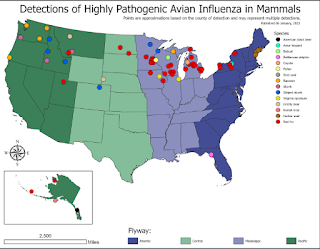
Credit USDA
#17,239
Since most infected animals either recover - or die unnoticed in the wild - we don't really have a good sense of how many birds and mammals have been infected, or killed, by HPAI H5Nx avian flu since it arrived in North America just over a year ago.
Thu USDA lists more than 5,800 outbreaks in wild birds, but each event can range from a few birds, to thousands. Most are never recovered, or tested, but the count is probably in the millions.
The USDA also tracks the detection of H5N1 in terrestrial and marine mammals, and as of their last update, lists 110 known cases.
This increased susceptibility of mammalian hosts of HPAI H5N1 is an obvious concern - particularly given the reports of severe illness and neurological manifestations - and the fact that 2 of the six known human infections with this clade have been severe (1 fatal).
Yesterday the Montana FWP (Fish, Wildlife & Parks) department published the following announcement which reports the infection with HPAI H5, and subsequent euthanization, of 3 grizzly bear cubs in recent months.
Jan 17, 2023 3:10 PM
HELENA – Three juvenile grizzly bears tested positive for highly pathogenic avian influenza (HPAI) virus this fall. The three bears, one near Augusta, one near Dupuyer, and another near Kalispell, were observed to be in poor condition and exhibited disorientation and partial blindness, among other neurological issues. They were euthanized due to their sickness and poor condition. These were the first documented cases of HPAI in grizzly bears. A fox and a skunk in Montana also tested positive for HPAI last year, and the virus has been found in raccoons, black bears and even a coyote in other states and countries.
“We suspect these mammals probably get the virus from consuming infected birds,” said FWP Wildlife Veterinarian Jennifer Ramsey.
Avian influenza (AI) virus is a naturally occurring virus in birds. AI viruses are classified into two groups, based on the severity of disease they cause in infected poultry. Low pathogenic AI viruses generally cause no clinical illness, or only minor symptoms in birds. HPAI viruses are extremely infectious and fatal to poultry and some species of wild birds.
Although the Centers for Disease Control and Prevention (CDC) considers risk of HPAI spread to humans to be very low, Montanans should take precautions when handling game birds, sick or dead birds and mammals they find. Whenever possible, avoid contact with sick or dead wildlife. Even if an animal is not suspected to have died from a contagious disease, gloves should always be worn if a dead animal must be handled for disposal.
FWP staff would like to know about unusual or unexplained cases of sickness and/or death of wild birds and animals by calling their local wildlife biologist or the wildlife lab in Bozeman at 406-577-7880 or 406-577-7882.
Among terrestrial mammals, peridomestic species (foxes, skunks, raccoons, etc.) are the most commonly reported with HPAI, but we've previously seen black and brown bears infected with H5N1 as well, including:
Alaska DF&G: Brown Bear Cub Tests Positive for Avian Influenza
Canada: First Detection Of H5N1 In A Black Bear
And while rare, companion animals (like dogs and cats) can be exposed (see WOAH: France Reports Cat Infected With Avian H5N1), which has lead the CDC to offer guidance for pet owners.
As a general precaution, people should avoid direct contact with wild birds and observe wild birds only from a distance, whenever possible. People should also avoid contact between their pets (e.g., pet birds, dogs and cats) with wild birds. Don’t touch sick or dead birds, their feces or litter, or any surface or water source (e.g., ponds, waterers, buckets, pans, troughs) that might be contaminated with their saliva, feces, or any other bodily fluids without wearing personal protective equipment (PPE). More information about specific precautions to take for preventing the spread of bird flu viruses between animals and people is available at Prevention and Antiviral Treatment of Bird Flu Viruses in People. Additional information about the appropriate PPE to wear is available at Backyard Flock Owners: Take Steps to Protect Yourself from Avian Influenza.